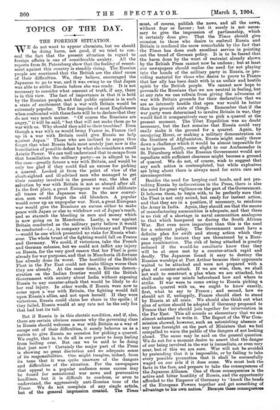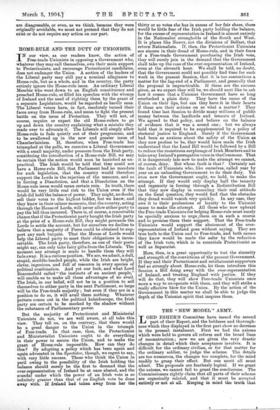though a war with us would bring France in, France
tied up in a war with Britain could give Russia no help against Japan." Those who are inclined to argue thus forget that what Russia feels most acutely just now is the humiliation of possible defeat by what she considers a small Asiatic Power. We can well understand that to escape from that humiliation the military party—as is alleged to be the case—greatly favour a war with Britain, and would be only too glad if they could find an excuse for picking a quarrel. Looked at from the point of view of the short-sighted and ill-advised men who managed to get their country involved in the present war, the idea of salvation by war with Britain is not so absurd after all. In the first place, a great European war would obliterate all traces of the Japanese war. In the new convul- sion men would forget the old blunders. A popular would cover up an unpopular war. Next, a great European war would give the Russians an excuse either to make peace with Japan or else to withdraw out of Japan's reach, and so staunch the bleeding in men and money which is now going on in Manchuria. Lastly, a war against Britain conducted as the military party believe it would be conducted—i.e., in company with Germany and France —would be one which presented no risks for Russia what- ever. The whole brunt of the fighting would fall on France and Germany. We could, if victorious, take the French and German colonies, but we could not inflict any injury on Russia, for the very good reason that her Fleet is gone already for war purposes, and that in Manchuria ill-fortune has already done its worst. The hostility of the British Fleet in the Far East could not make things worse than they are already. At the same time, a Russian demon- stration on the Indian frontier would fill the British Government with anxiety about India without exposing Russia to any counter-attack that would be likely to do her real injury. In other words, if Russia were now to enter upon a war with Britain, the fighting would fall upon Russia's allies, and not upon herself. If they were victorious, Russia could claim her share in the spoils ; if they failed, Russia would at any rate not be the only fox that had lost its tail.
But if Russia is in this electric condition, and if, also, there are certain obvious reasons why the governing class in Russia should welcome a war with Britain as a, way of escape out of their difficulties, it surely behoves us as a nation to give Russia no occasion for picking a quarrel. We ought, that is, to do all in our power to keep feeling from boiling over. But can we be said to be doing that just now ? Certainly the major part of the Press is showing no great discretion and no adequate sense of its responsibilities. One might imagine, indeed, from its tone that it was .quite unaware of the dangers and difficulties of the situation. For the newspapers that appeal to a popular audience some excuse may be found for sensational war news and provocative headlines, but it is difficult to condone, or even to understand, the aggressively anti-Russian tome of the Times. We do not complain of any single . article, but of the general impression created. The Times must, of course, publish the news, and all the news, without fear or favour ; but it surely is not neces- sary to give the impression of partisanship, which it certainly does give. That the Times should give occasion to those who desire to embroil Russia and Britain is rendered the more remarkable by the fact that the 2'ime8 has done such excellent service in pointing out the trend of German policy. It is to be feared that the harm done by the want of restraint already shown by the British Press cannot now be undone ; but at least our newspapers should realise the need for not playing into the hands of the military party in Russia, or pro- viding material for those who desire to prove to France that her ally has been dealt with in an unfair and hostile spirit by the British people. We cannot now hope to persuade the Russians that we are neutral in feeling, but at any rate we can refrain from giving the advocates of war with Britain grounds for their declaration that we are so intensely hostile that open war would be better than the present state of things. Remember that if the war party were determined to involve Britain in war, they would find it comparatively easy to pick a quarrel at the present moment. The Tibet Expedition was no doubt necessary, but the fact remains that Russia could very easily make it the ground for a quarrel. Again, by occupying Herat, or making a military demonstration on the frontiers of Afghanistan, Russia might easily throw down a challenge which it would be almost impossible for us to ignore. Lastly, some slight to our Ambassador in St. Petersburg which the Russian Government would not repudiate with sufficient clearness might become a ground of quarrel. We do not, of course, wish to suggest that any such action is contemplated, but while explosives are lying about there is always need for extra care and circumspection.
Besides the need for keeping cool heads, and not pro- voking Russia by indiscretions in the Press, there is also the need for great vigilance on the part of the Government. It behoves them, to begin with, to be perfectly sure that the Fleet is not only sound, but ready for instant action, and that they are in a position, if necessary, to reinforce the Army in India. Again,they should see that the means of manufacturing ammunition is adequate, and that there is no risk of a shortage in naval ammunition analogous to that which hampered us during the South African War. But even more important than this is the need for a coherent policy. The Government must have a definite plan for swift and strong action which they can apply the instant they are threatened by a Euro- pean combination. The risk of being attacked is greatly reduced if the would-be assailants know that they will be at once met by a counter-attack rapid and deadly. The Japanese found it easy to destroy the Russian warships at Port Arthur because their opponents waited to be attacked and were not prepared with a plan of counter-attack. If we are wise, then, we shall not wait to construct a plan when we are attacked, but shall make up our minds beforehand how and where to strike. If war were to come owing to Russia picking a sudden quarrel with us, we ought to know exactly, first, what to say to France ; and second, how we should act if, unhappily, France should elect to stand by Russia at all costs. We should also think out what plan of action should be adopted if Germany proposed to France that they should join together for intervention in the Far East. This all sounds so elementary that we are almost ashamed to write it. The Report of the War Com- mission showed, however, such an astonishing absence of any true foresight on the part of Ministers that we feel compelled to warn the public of the dangers of not looking ahead. The same may be said on the general question. We do not for a moment desire to assert that the danger of our being involved in the war is immediate, or even very near, but of this we are sure. War will not be avoided by pretending that it is impossible, or by falling to take every possible precaution that it shall be successfully waged on our side if it does come. We must look the facts in the face, and prepare to take the consequences of the Japanese Alliance. One of those consequences is the active and bitter hostility of Russia, and the opportunity afforded to the Emperor of Germany to knock the head's of the European Powers together and get something of advantage to his own nation.' Because these consequences are disagreeable, or even, as we think, because they were originally avoidable, we must not pretend that they do not exist or do not require any action on our part.











































 Previous page
Previous page